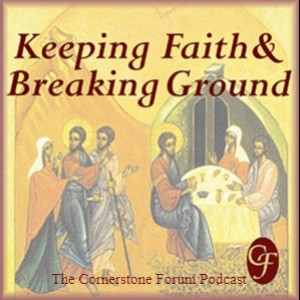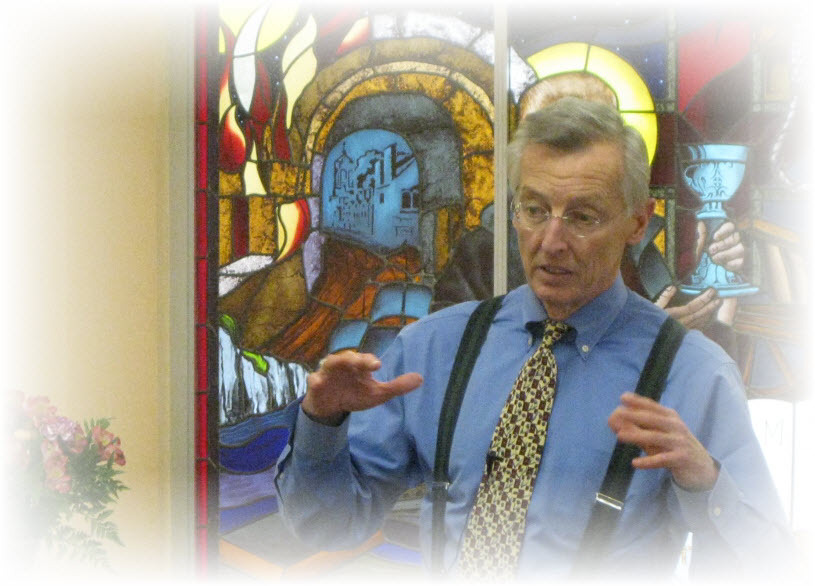Episodes

Tuesday Oct 19, 2021
Tuesday Oct 19, 2021
Publius Vergillius Maro, 70-19 BCE, wrote his epic poem seemingly to honor the Pax Romana of Emperor Augustus. But does his poetic skill hide a truth? An undercurrent of doubt about the sustainability of the Roman enterprise haunts the poem leading to a labyrinthine dead end foreshadowed at Rome’s founding in the brutal slaying of the Rutulian king Turnus by Aeneas. Peace via the sword will be Rome’s legacy until the coming of the Prince of Peace in the dusty Galilean outback of the Augustan empire…(to be continued in the Poetry of Truth—Reflections on the Gospel of Luke.)

Monday Oct 18, 2021
Monday Oct 18, 2021
This series originally recorded in 1995 began with a presentation on Mark Twain’s posthumously published “The United States of Lyncherdom”. It was later thought that, although a valuable piece, it would be better presented on its own and not used as an introduction to the Gospel of Luke. However, you will hear an occasional reference to this at points in these reflections.
The author of the Gospel of Luke and the Acts of the Apostles, St. Luke, is traditionally known as a sophisticated non-Jew Hellenist and perhaps a physician. He was an early convert to the Christian faith, most likely through the preaching of St. Paul. But, as Gil Bailie points out in this presentation, Luke is above all a gifted teller of tales – or rather a re-teller of tales. The stories in Luke’s gospel are vivid and distinctive among the synoptic gospels.

Sunday Oct 17, 2021
Sunday Oct 17, 2021
This series originally recorded in 1995 began with a presentation on Mark Twain’s posthumously published “The United States of Lyncherdom”. It was later thought that, although a valuable piece, it would be better presented on its own and not used as an introduction to the Gospel of Luke. However, you will hear an occasional reference to this at points in these reflections.
The author of the Gospel of Luke and the Acts of the Apostles, St. Luke, is traditionally known as a sophisticated non-Jew Hellenist and perhaps a physician. He was an early convert to the Christian faith, most likely through the preaching of St. Paul. But, as Gil Bailie points out in this presentation, Luke is above all a gifted teller of tales – or rather a re-teller of tales. The stories in Luke’s gospel are vivid and distinctive among the synoptic gospels.

Saturday Oct 16, 2021
Saturday Oct 16, 2021
This series originally recorded in 1995 began with a presentation on Mark Twain’s posthumously published “The United States of Lyncherdom”. It was later thought that, although a valuable piece, it would be better presented on its own and not used as an introduction to the Gospel of Luke. However, you will hear an occasional reference to this at points in these reflections.
The author of the Gospel of Luke and the Acts of the Apostles, St. Luke, is traditionally known as a sophisticated non-Jew Hellenist and perhaps a physician. He was an early convert to the Christian faith, most likely through the preaching of St. Paul. But, as Gil Bailie points out in this presentation, Luke is above all a gifted teller of tales – or rather a re-teller of tales. The stories in Luke’s gospel are vivid and distinctive among the synoptic gospels.

Friday Oct 15, 2021
Friday Oct 15, 2021
This series originally recorded in 1995 began with a presentation on Mark Twain’s posthumously published “The United States of Lyncherdom”. It was later thought that, although a valuable piece, it would be better presented on its own and not used as an introduction to the Gospel of Luke. However, you will hear an occasional reference to this at points in these reflections.
The author of the Gospel of Luke and the Acts of the Apostles, St. Luke, is traditionally known as a sophisticated non-Jew Hellenist and perhaps a physician. He was an early convert to the Christian faith, most likely through the preaching of St. Paul. But, as Gil Bailie points out in this presentation, Luke is above all a gifted teller of tales – or rather a re-teller of tales. The stories in Luke’s gospel are vivid and distinctive among the synoptic gospels.

Thursday Oct 14, 2021
Thursday Oct 14, 2021
This series originally recorded in 1995 began with a presentation on Mark Twain’s posthumously published “The United States of Lyncherdom”. It was later thought that, although a valuable piece, it would be better presented on its own and not used as an introduction to the Gospel of Luke. However, you will hear an occasional reference to this at points in these reflections.
The author of the Gospel of Luke and the Acts of the Apostles, St. Luke, is traditionally known as a sophisticated non-Jew Hellenist and perhaps a physician. He was an early convert to the Christian faith, most likely through the preaching of St. Paul. But, as Gil Bailie points out in this presentation, Luke is above all a gifted teller of tales – or rather a re-teller of tales. The stories in Luke’s gospel are vivid and distinctive among the synoptic gospels.

Wednesday Oct 13, 2021
Wednesday Oct 13, 2021
This series originally recorded in 1995 began with a presentation on Mark Twain’s posthumously published “The United States of Lyncherdom”. It was later thought that, although a valuable piece, it would be better presented on its own and not used as an introduction to the Gospel of Luke. However, you will hear an occasional reference to this at points in these reflections.
The author of the Gospel of Luke and the Acts of the Apostles, St. Luke, is traditionally known as a sophisticated non-Jew Hellenist and perhaps a physician. He was an early convert to the Christian faith, most likely through the preaching of St. Paul. But, as Gil Bailie points out in this presentation, Luke is above all a gifted teller of tales – or rather a re-teller of tales. The stories in Luke’s gospel are vivid and distinctive among the synoptic gospels.

Tuesday Oct 12, 2021
Tuesday Oct 12, 2021
This series originally recorded in 1995 began with a presentation on Mark Twain’s posthumously published “The United States of Lyncherdom”. It was later thought that, although a valuable piece, it would be better presented on its own and not used as an introduction to the Gospel of Luke. However, you will hear an occasional reference to this at points in these reflections.
The author of the Gospel of Luke and the Acts of the Apostles, St. Luke, is traditionally known as a sophisticated non-Jew Hellenist and perhaps a physician. He was an early convert to the Christian faith, most likely through the preaching of St. Paul. But, as Gil Bailie points out in this presentation, Luke is above all a gifted teller of tales – or rather a re-teller of tales. The stories in Luke’s gospel are vivid and distinctive among the synoptic gospels.

Monday Oct 11, 2021
Monday Oct 11, 2021
This series originally recorded in 1995 began with a presentation on Mark Twain’s posthumously published “The United States of Lyncherdom”. It was later thought that, although a valuable piece, it would be better presented on its own and not used as an introduction to the Gospel of Luke. However, you will hear an occasional reference to this at points in these reflections.
The author of the Gospel of Luke and the Acts of the Apostles, St. Luke, is traditionally known as a sophisticated non-Jew Hellenist and perhaps a physician. He was an early convert to the Christian faith, most likely through the preaching of St. Paul. But, as Gil Bailie points out in this presentation, Luke is above all a gifted teller of tales – or rather a re-teller of tales. The stories in Luke’s gospel are vivid and distinctive among the synoptic gospels.

Sunday Oct 10, 2021
Sunday Oct 10, 2021
This series originally recorded in 1995 began with a presentation on Mark Twain’s posthumously published “The United States of Lyncherdom”. It was later thought that, although a valuable piece, it would be better presented on its own and not used as an introduction to the Gospel of Luke. However, you will hear an occasional reference to this at points in these reflections.
The author of the Gospel of Luke and the Acts of the Apostles, St. Luke, is traditionally known as a sophisticated non-Jew Hellenist and perhaps a physician. He was an early convert to the Christian faith, most likely through the preaching of St. Paul. But, as Gil Bailie points out in this presentation, Luke is above all a gifted teller of tales – or rather a re-teller of tales. The stories in Luke’s gospel are vivid and distinctive among the synoptic gospels.

Keeping Faith & Breaking Ground
Without Christianity neither the nature of the present crisis of culture nor the meaning of history itself can be properly comprehended. If the Christian revelation is to come to our aid in this moment of peril, we must learn to account for its sweeping claims in ways that are faithful to Church teachings, intellectually cogent, morally rigorous, charitable, anthropologically sound, and undeterred by the moribund spirit of our age.



